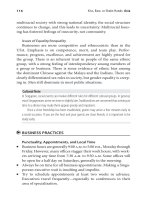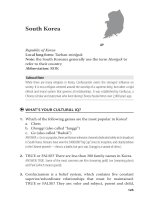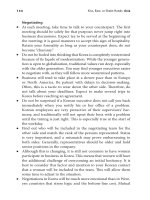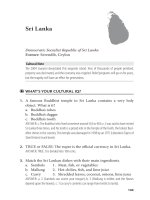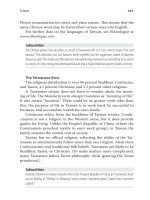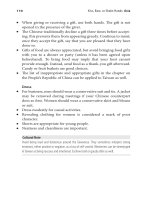How to Do Business in 12 Asian Countries 14
Bạn đang xem bản rút gọn của tài liệu. Xem và tải ngay bản đầy đủ của tài liệu tại đây (109.89 KB, 9 trang )
98
Kiss, Bow, or Shake Hands: Asia
bribes, and was impeached. Aer President Estrada capitulated, he
was replaced by the vice president, Gloria Macapagal-Arroyo. Presi-
dent Arroyo won a second term in 2004.
e Philippines faces a future relatively free of foreign inuences,
but without the millions of dollars the U.S. military presence pumped
into the economy. e country struggles with unemployment, a
uctuating economy, and a huge debt load, not to mention periodic
natural disasters.
Current government data can be found at the Embassy of Philip-
pines at www.philippineembassy.org.
Cultural Note
Filipinos grow up in extended families and are rarely alone. Indeed, solitude makes most
Filipinos uncomfortable. A foreigner’s desire for privacy is not usually understood. If you are
sitting alone on a bus or in a cinema, a Filipino is likely to ignore all the empty seats and sit
next to you. Such action is not about you; it is simply a cultural trait.
Language
Tagalog (Pilipino, Filipino) and English are the ocial languages of
the Republic of the Philippines. ere are eight major dialects: Tagalog,
Cebuano, Ilocan, Hiligaynon or Ilonggo, Bicol, Waray, Pampango, and
Pangasinense. e literacy rate is approaching 90 percent.
Ethnologue.com acknowledges 172 languages in the Philippines,
3 of which are extinct.
The Philippine View
e Philippines has no ocial religion, but approximately 83 per-
cent of Filipinos consider themselves Roman Catholic. While only 9
percent of Filipinos are Protestant, their Evangelical sects are growing
rapidly. ere is also a Philippine Independent Church, which claims
some 6 percent of the population (they were Roman Catholics, but
broke with Rome). Followers of Islam are concentrated in the south.
anks in part to the Catholic Church’s opposition to birth con-
trol, the Philippines has a very high birth rate. (Former President
Estrada himself had at least ten children.)
Social scientists have found that most Filipinos have a fairly low
uncertainty avoidance index. Societies that score high on this scale
feel the need for creating rigid rules of behavior and extensive sets
of laws to enforce them. At the opposite end of the scale, Philippine
society and behavior exhibits exibility and adaptability. e letter
of the law is not strictly observed, and there are not regulations to
cover every situation. is situation is probably ideal for a sprawling,
geographically divided, multicultural society. But it has disadvan-
tages for foreigners who assume that laws exist to be followed. For
example, comprehensive building codes do not exist in all areas of
the Philippines, and where they are present, they may not be strictly
adhered to or enforced.
Curiously, this does not prevent companies from adopting
extensive in-house regulations for their employees. is reects the
diculty that a supervisor has in disciplining an employee who is
probably related to several company employees (or even related to the
boss). By detailing punishments for various infractions, the manager
stays at a dignied distance from any necessary disciplinary action.
Great inequalities exist in the Philippines. e majority of the
population is poor. But mobility (or the hope of mobility) exists.
e most important inuence on Filipinos is the family. Nepotism is
common and is not considered to be detrimental.
Cultural Note
The enforcement of regulations is often used as a weapon among competitors. One party
with government connections may be allowed to flout regulations, while competitors are
strictly held to the letter of the law. It is summed up in this Philippine expression: “For my
friends—everything, for my enemies—the law.”
■
*
Know Before You Go
The Philippines is prone to disasters. Many are natural events, such as volcanoes, floods,
mudslides, earthquakes, and typhoons. But some are within human control, like boat
accidents. If you are considering taking a ferry, examine it closely—if it looks unsafe
or overcrowded, seek alternative transportation. Whatever your travel plans, be sure to
obtain medical evacuation insurance.
Philippines
99
100
Kiss, Bow, or Shake Hands: Asia
To avoid the monsoon season, try to schedule your visits between September and
May. Avoid major Catholic holidays as well, as many Filipinos will observe Christmas and
Easter celebrations.
There is a risk of getting malaria, typhus, or cholera outside of the major urban areas. Be
sure to review the inoculations that your physician or the CDC (at www.cdc.gov) suggests.
Illegal logging has added to the high number of disasters in the Philippines. More
than half of the Philippines’ forests were ravaged over the last century. This deforesta-
tion, combined with fierce tropical storms, promoted flash flooding and landslides in the
eastern and northern regions. These catastrophes took at least 5,000 lives in 1991, and
thousands more in the northeast in late 2004.
●
3
CULTURAL ORIENTATION
Cognitive Styles: How Filipinos Organize
and Process Information
Filipinos love to converse. ey are generally open to informa-
tion, but do not change their attitudes readily. Because most of their
education is by rote, they tend to process information subjectively
and associatively. ey tend to become personally involved in prob-
lems rather than using rules and laws to solve them.
Negotiation Strategies: What Filipinos Accept as Evidence
Most truth comes from direct feelings. Although some absolute
truths may rest on faith in ideologies (such as those of the Catholic
Church), few are easily traced back to objective facts.
Value Systems: The Basis for Behavior
e culture of the Philippines is rich and diverse. China, Islam,
Spain, and the United States all le their marks. e following three
sections identify the Value Systems in the predominant culture—their
methods of dividing right from wrong, good from evil, and so forth.
Locus of Decision-Making
Individuals act in the context of a group (the family is the most
important group). us, they must seek the consensus of the group,
because the individual rarely feels that he or she has the nal say on
anything. Decisions are made from a relational perspective. Filipinos
must get to know you, and this involves asking about your family and
personal background. Rather than presenting their own ideas, they
more oen react to the input of others. It is dicult for them to be
confrontational and give an outright “no.”
Sources of Anxiety Reduction
e nuclear and extended family is the main source of support
and stability. e whole family may be shamed by the action of one
member. Much of the stability of life is found in the adherence to
tradition, especially the observance of rituals that maintain rela-
tionships. Many of these are connected with religion. Interpersonal
relationships bring with them a sense of obligation. Reciprocity in
relationships is practiced on all levels, and paying one’s obligations
binds the persons involved more closely.
Issues of Equality/Inequality
Filipino politics is a system that serves its players, not the people.
However, Filipinos are strongly in favor of democracy, individual
freedom, education, and freedom of the press. Filipinos are very sta-
tus conscious. is sometimes extends to issues of race—for example,
the lighter the skin, the higher the status. ere is a preoccupation
with chastity and safety.
●
3
BUSINESS PRACTICES
Punctuality, Appointments, and Local Time
●
Business hours are generally from 8:00 .. to 5:00 .., Monday
through Friday.
●
Oces may close for a lunch break, which can easily stretch for
two hours. Some oces may open from 8:00 .. to 12:00 noon
on Saturdays.
●
Time is malleable. Foreign executives are expected to be on time
to business meetings. Filipinos tend to be reasonably punctual.
●
Everyone, even foreigners, is expected to be late for social events.
But the exact measure of the delay depends upon the status of each
Philippines
101
102
Kiss, Bow, or Shake Hands: Asia
person. (e highest-ranking person should arrive last.) Rather
than try to decipher the ranking of each party guest, foreigners
should just ask their host (in private) what time they should actu-
ally arrive.
●
e exception to the socially correct delay is the Filipino wed-
ding. Guests are expected to arrive on time. Only the bride may
be late.
●
Appointments can be scheduled far in advance of your arrival in
the Philippines.
●
English is the language of most business transactions and virtu-
ally all business or government correspondence.
●
Without introductions, it is very dicult to meet decision-
makers. You will end up scheduling many appointments with
subordinates. Not only will you have to progress through levels
of inuence, but you must progress through levels of formality—
from introductions at social events, to semiocial luncheons, to
scheduled business meetings.
●
A skilled representative is oen hired to cut through several levels
of management to get to the decision-maker.
●
Midmornings, midaernoons, or late aernoons are usually best
for appointments.
●
e ocial national Independence Day holiday is June 12th,
which was the date of declaration of independence from Spain
(in 1898). July, 4th, 1946, was their date of independence from the
United States of America. For the ocial holidays of the Philip-
pines, visit www.kissboworshakehands.com.
●
e Philippines is eight hours ahead of Greenwich Mean Time
(G.M.T. + 8), or thirteen hours ahead of U.S. Eastern Standard
Time (E.S.T. + 13).
Cultural Note
Filipinos are strong believers in forging relationships and maintaining pakikisama (smooth
relations) at all costs. Confrontation is unthinkable and a sign of disrespect. Part of this process
is the utang na loob (reciprocity) system whereby one business (or political) connection leads
to other, more lucrative, deals. Acceptance of a favor or reference will call for a larger one in
return. Beware the Filipino bearing gifts—a simple “thank you” will not suffice.



